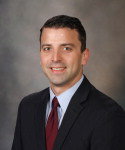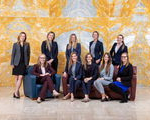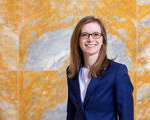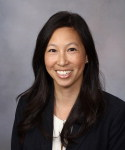Building stronger teams through diversity: Closing the gender gap in orthopedics
Orthopedic surgery is the medical specialty with the lowest proportion of women — only 5% of active physicians are in orthopedic surgery. That number has been stable for some time. Orthopedic surgery also has the lowest proportion of women residents, at 14-15%. While other predominantly male specialties have made gains in recruiting women in the last 15 years, orthopedic surgery has not. Women may avoid specialties in which they don’t see role models who look like them and are in positions of visibility, influence and leadership.
The women trainees in Mayo Clinic’s Department of Orthopedic Surgery are an exception. Now, for the first time, more than 50% of new trainees (residents and fellows who entered the programs in 2019) in Mayo Clinic’s Department of Orthopedic Surgery in Rochester, Minnesota, are women. Among all of the 77 orthopedic surgery trainees, 19% of residents are women, and 57% of fellows are women, for a total of 27% women trainees in the department (all classes combined).
“The women trainees in Mayo Clinic’s Department of Orthopedic Surgery are an exception. Now, for the first time, more than 50% of new trainees (residents and fellows who entered the programs in 2019) in Mayo Clinic’s Department of Orthopedic Surgery in Rochester, Minnesota, are women.”
 “This is an important milestone for us,” says Jonathan Barlow, M.D. (OR ’13), the Orthopedic Surgery Residency Program assistant program director. “We’ve worked hard to build the pipeline of trainees in our programs, which will lead to more women on our consultant staff. This starts with encouraging women to do away rotations in orthopedic surgery at Mayo Clinic to show them that Mayo is a great place to train, and then urging them to apply for residency. Because we tend to hire from our residency program, these efforts represent the future of our program, our faculty and our field. We have no doubt that we’re getting the best residents in the country — women and men, and we plan to keep up this momentum.”
“This is an important milestone for us,” says Jonathan Barlow, M.D. (OR ’13), the Orthopedic Surgery Residency Program assistant program director. “We’ve worked hard to build the pipeline of trainees in our programs, which will lead to more women on our consultant staff. This starts with encouraging women to do away rotations in orthopedic surgery at Mayo Clinic to show them that Mayo is a great place to train, and then urging them to apply for residency. Because we tend to hire from our residency program, these efforts represent the future of our program, our faculty and our field. We have no doubt that we’re getting the best residents in the country — women and men, and we plan to keep up this momentum.”
When A. Noelle Larson, M.D. (OR ’09), interviewed for residency, Mayo Clinic’s history of training women in orthopedic surgery appealed to her. She cites Kristy Weber, M.D. (ORONC ’08), chief of orthopedic oncology at Penn Medicine in Philadelphia and immediate past president of the American Academy of Orthopaedic Surgeons — the organization’s first woman president; Mary O’Connor, M.D. (OR ’90, ORONC ’91), director of the Center for Musculoskeletal Care at Yale Medicine, former chair of the Department of Orthopedic Surgery at Mayo Clinic in Florida, and the first woman president of the American Association of Hip and Knee Surgeons; Amy McIntosh, M.D. (OS ’06), a pediatric orthopedic surgeon at Scottish Rite for Children in Dallas Texas; and Mayo Clinic’s Diane Dahm, M.D. (OR ’97).
“Women who trained in the Department of Orthopedic Surgery have been well-mentored and have had career opportunities that put them on a pathway to success,” says Dr. Larson. “I haven’t felt any boundaries at Mayo in terms of how people are treated, and there is little hierarchy. Mayo has a highly professional and collegial environment where we help each other solve problems. It’s a wonderful culture for women in orthopedic surgery.”
Let’s hear from the residents
Rachel Honig, M.D. (OR ’20), says she chose Mayo Clinic for orthopedic surgery residency because it’s a place where she can work hard and reach her maximum potential.
Resident Annie Smartt, M.D. (OR ’20), knows orthopedic surgery has a very low percentage of women physicians — all the more reason for her to choose it. “Orthopedic surgery is an area that needs strong women, and I want to play that role,” she says. “I come from a long lineage of strong women who are driven to help others. I’m proud to change the statistic and create a wave of women in orthopedic surgery.”
Katherine Mallett, M.D. (OR ’20), a resident in orthopedic surgery, also pursued the specialty in part because of stereotypes about orthopedic surgeons. “I’m not what people typically picture when they think of an orthopedic surgeon, which made me want to do it even more,” she says. “Other women blazed the trail for me; I want to help widen the trail that leads to success for women in orthopedic surgery.
“When I interviewed for residency and debated about my top choice, I thought about the women I admired on the interview trail and wondered where these superstar trailblazers trained. Four or five of them trained at Mayo Clinic. That must be the secret. There’s something about being at Mayo Clinic that helps women in orthopedic surgery reach their potential. I want to follow in the footsteps of these leaders and be at an organization where I can become a leader, have a seat at the table and have my voice heard.”
“There’s something about being at Mayo Clinic that helps women in orthopedic surgery reach their potential. I want to follow in the footsteps of these leaders and be at an organization where I can become a leader, have a seat at the table and have my voice heard.”
Dr. Mallett, who attended the University of Massachusetts Medical School, applied to Mayo Clinic’s residency program on a whim, thinking Mayo wouldn’t be interested in her. The night before her interview, she watched the PBS documentary, “The Mayo Clinic: Faith – Hope – Science.”
“I went into the interview with a more critical eye, wanting to see if the ethos described in the documentary was true,” she says. “I came away believing that every surgeon who operates at Mayo Clinic knows and lives the institution’s core value — the needs of the patient come first. I couldn’t tell you the mission statements of other hospitals I’ve been to.
“In my interview, Dr. Barlow told me, “’Not every program will make you a better surgeon, researcher and person.’ I want to be the best I can be for my patients and make the absolute most of these five years of training. Mayo was my first interview, and nowhere else compared. I tried hard to find a better program and couldn’t.”
 Mayo Clinic also was Dr. Smartt’s first residency interview. “It blew me out of the water,” she says. “So many facets of the Mayo program were what I wanted. I liked the mentorship model, supportive people and vast resources that aren’t available to residents at all places. I can practice total knee replacement on cadavers. At every interview, I asked myself, ‘Is it as good as Mayo?’ That became my standard. I’m from Colorado and attended medical school at Columbia University. I hadn’t envisioned myself in Rochester, Minnesota, but the program is so exceptional that I wanted to come here. It’s a phenomenal place to train.”
Mayo Clinic also was Dr. Smartt’s first residency interview. “It blew me out of the water,” she says. “So many facets of the Mayo program were what I wanted. I liked the mentorship model, supportive people and vast resources that aren’t available to residents at all places. I can practice total knee replacement on cadavers. At every interview, I asked myself, ‘Is it as good as Mayo?’ That became my standard. I’m from Colorado and attended medical school at Columbia University. I hadn’t envisioned myself in Rochester, Minnesota, but the program is so exceptional that I wanted to come here. It’s a phenomenal place to train.”
“I’m from Colorado and attended medical school at Columbia University. I hadn’t envisioned myself in Rochester, Minnesota, but the program is so exceptional that I wanted to come here. It’s a phenomenal place to train.”
Dr. Honig, who received her medical degree from the University of Missouri School of Medicine, says she liked seeing good representation of women among the residents and physician staff at Mayo Clinic. “That stood out to me; it’s not that way everywhere.” Dr. Honig is quick to point out that the men physicians in the department are passionate about being good mentors to women trainees. During a rotation, Matthew Houdek, M.D. (OR ’16), gave me a paper to work on for publication. Brett Freedman, M.D. (OR ’18), also has given me opportunities to work on research and papers with him, and he laid out a timeline of the papers I’ll need to publish to get a good fellowship. He’s helped me see the big picture about next steps in my career. Dr. Barlow also sought me out to write book chapters. In a male-dominated specialty, it’s so nice to have all these men and women physicians on my side. I feel fortunate to have this mentorship and sponsorship. The kindness from the top down is spectacular.”
The fellows speak
Elizabeth Gausden, M.D. (ORAL ’20), and Jennifer Tangtiphaiboontana, M.D. (ORAU ’20), are fellows in the Department of Orthopedic Surgery. Dr. Gausden says she was attracted to Mayo Clinic’s strong training program in lower extremity joints — a very male-dominated subspecialty.
“I love it at Mayo,” she says. “Everyone is really proud to work here, and the complexity of cases is better than anywhere else in the U.S. My fellowship experience has exceeded my expectations. It’s exciting to see more women pursue and excel in orthopedic surgery. The old concept of orthopedic surgeons needing to be tall and burly has been thrown out the window.”
Dr. Tangtiphaiboontana says she chose Mayo Clinic for fellowship because the consultants are the world’s experts in shoulder and elbow surgery. “When I interviewed at Mayo, I was struck by how these world-renowned, famous surgeons were so down to earth and genuinely interested in mentoring the next generation in the field.
“The shoulder/elbow field is male-dominated, but I’ve had extraordinary support and encouragement from my male colleagues at Mayo. Like Dr. Gausden alluded, you don’t have to be 6 feet tall and able to bench press 200 pounds to do this job. You learn how to use leverage to your advantage..”
No compromises
Dr. Smartt says she sought a training environment with good female representation, and hopes parity in the profession is on the horizon. “Diversity of people and opinion benefits medicine. Women bring a different voice and viewpoint to the field. As a medical student, I would’ve told you that manly jocks who put bones back together go into orthopedic surgery. My point of view has changed in the last several years. I feel like I’m with ‘my people.’ I’ve wanted to be a doctor since I was 13. I’m a ‘Smartt’ girl — I’m not going to compromise on my dream now.”
“I feel like I’m with ‘my people.’ I’ve wanted to be a doctor since I was 13. I’m a ‘Smartt’ girl — I’m not going to compromise on my dream now.”
Trainee Q&A
How’d you get interested in orthopedic surgery?
Elizabeth Gausden, M.D.: I always liked the idea of being a physician. I grew up playing sports and played softball in college. I worked with the team physicians at the University of Wisconsin-Madison and did research that got me interested in orthopedics.
Rachel Honig, M.D.: Pretty early in medical school, I fell in love with musculoskeletal anatomy. I saw how orthopedic surgeons fix problems that are unique and improve the lifestyles of patients. Orthopedic surgery has very tangible results, which makes for a satisfying career.
A. Noelle Larson, M.D.: I was interested in surgery, but orthopedics wasn’t on my radar. I was thinking otorhinolaryngology but did a rotation and didn’t like it. At the end of the third year of medical school, I had a two-week orthopedic surgery rotation and liked the combination of engineering, physics and surgery.
Katherine Mallett, M.D.: Science and biology came easily to me, and I planned to pursue engineering in college. I waded into neuroscience in a lab but missed people contact. I’m an outgoing person. I was a rower at Harvard during undergrad. I got hurt and met with an orthopedic surgeon about my hip injury. I became interested in orthopedics and shadowed a hip and knee surgeon in Boston. I loved the engineering, physics and science aspects of it and saw how well patients did. I could restore someone’s mobility. To make sure it was the right specialty for me, I worked at the Hospital for Special Surgery in New York City.
Annie Smart, M.D.: When I was 13, I told my mom I was going to become a doctor. I’m blessed with a very supportive family. My mom said, “OK, honey. We’ll get you into as many science classes as possible.” Fast forward to medical school and I would’ve told you orthopedic surgery was my last choice. In my first surgical rotation, I thought, “This is what I want to do for the rest of my life.” I like the big bone work in orthopedic surgery and seeing problems fixed and patients get better. It’s gratifying. If you look at orthopedic surgeons who have been in practice for 20 or 30 years, they’re very happy. A high percentage of them said they’d choose this specialty again. When I look down the road at my life, I want to love my career decision. The other day, I walked into work and thought, I’m so lucky to get to do this.”
In my first surgical rotation, I thought, “This is what I want to do for the rest of my life.”
Jennifer Tangtiphaiboontana, M.D.: I didn’t become interested in orthopedic surgery until my third year of medical school. I started medical school thinking that I was going to pursue a career in pediatrics. However, I feel in love with surgery and the operating room on my surgical rotation. I explored and shadowed various surgical subspecialties and was in awe of what orthopedic surgeons can do to help restore a patient’s function.



